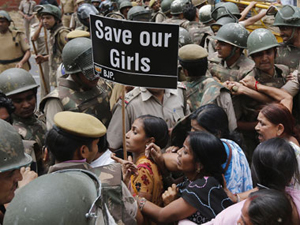 Mumbai, Dec 4: Mumbai city has witnessed 237 rapes, including eight gangrapes till August this year, with police saying that in most cases, the victims knew the accused, majority of whom were either "friends and lovers" or neighbours.
Mumbai, Dec 4: Mumbai city has witnessed 237 rapes, including eight gangrapes till August this year, with police saying that in most cases, the victims knew the accused, majority of whom were either "friends and lovers" or neighbours.
As per the information procured under Right to Information Act (RTI) by social worker Anil Galgali, as many as 229 rape cases and eight gangrape cases, including two Shakti Mills gangrapes that jolted the nation, were reported till August this year.
"The number of such cases will go up by the end of this year, as in November alone two gangrapes of minors were reported in suburban Dindoshi and Borivali," said Galgali.
Last year, 223 rape cases and eight gangrape cases were reported, while in 2011 as many as 211 rapes and nine gangrapes were registered. In 2010, a total 188 sexual assault cases while seven gangrapes were reported.
"Women are unsafe in the first place because police presence on the streets has decreased over the years," the activist claimed.
"Nakabandis are also not conducted frequently," he added.
However, police claim that Mumbai is the "safest city" in the country and in most of the cases, the rape victims have fallen prey to either "friends and lovers" or neighbours.
"If we have a look at the past cases, it will be clearly evident that the accused in rapes and gangrape cases are either friends, lovers, relatives or neighbours," said Bhagwan Chate, Assistant Police Commissioner (Spokesperson) of Mumbai police.
The incidents like Shankti Mills gangrapes are rare, he said, adding that, "We are committed to give our best to prevent all sort of crimes in the city and reduce the crime rate drastically."





Comments
Add new comment